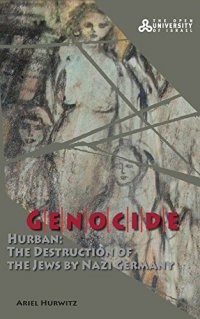Genocide is a serious crime by which people murder other people due to their
membership in a group of national, ethnic, racial, or religious character, unrelated
to any personal accusation against the individuals killed.
This book explores the concept of genocide (and an assortment of related concepts,
including Holocaust, politicide, democide, and ethnocide), the challenges in
defining it, and relevant debates. It surveys the major theories and typologies that
have been developed to explain the genocides committed after the Holocaust –
genocides that have taken the lives of millions of innocent people.
This book was published as part of a series entitled Genocide. The series consists
of eight volumes which together provide a comprehensive exploration of the
subject. Each volume stands alone in its own right, but is also an integral part of a
broader assessment of the phenomenon.
Titles in the series include:
● Yair Auron, Reflections on the Inconceivable: Theoretical Aspects in Genocide
Studies
● Arnon Gutfeld, Genocide in the
“Land of the Free”: The Indians of Northern
America, 1776-1890
● Eitan Ginzberg, Conflictual Encounter: The Destruction of the Indian Peoples
of Spanish America
● Yair Auron, The Armenian Genocide: Forgotten and Denied
● Benyamin Neuberger, Rwanda 1994: Genocide in the “Land of a Thousand
Hills”
● Israel Charny, “And You Shall Destroy the Evil Inside of You”: We are the
Human Beings who Commit Holocaust and Genocide
● Gilad Margalit, Nazi Germany and the Gypsies
Dr. Ariel Hurwitz is a Holocaust historian. He has taught at the Kibbutz Teachers
College and the Open University. For many years he was editor of Yalkut Moreshet,
a journal for the study of the Holocaust and Antisemitism and has published a number of books and numerous articles on the Holocaust.





